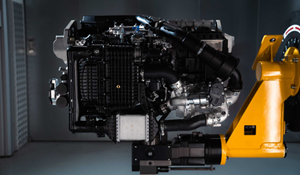News
BMW Group to begin series production of fuel cell systems
BMW Group Plant Steyr is getting ready for series production of fuel cell systems. The third generation of the BMW Group’s H2 drive system will be manufactured in Steyr from 2028, and the company’s competence centres in Munich and Steyr are already building the first prototypes. Further drive system components will come from the technology hub in Landshut.
“The launch of the first-ever fuel cell production model from BMW in 2028 will add another exceptionally efficient high-performance drive system with zero emissions to our technology-open product portfolio,” said Joachim Post, Member of the Board of Management of BMW AG, Development. “The choice of Steyr as the production location clearly demonstrates our commitment to a European innovation footprint. The BMW competence centers in Munich and Steyr have a key role to play in the development of pioneering fuel cell systems.”
The first generation of the fuel cell drive system was supplied entirely by the Toyota Motor Corporation (Toyota) and was fitted in the BMW 535iA back in 2014. The second generation made its debut in the current BMW iX5 H2 pilot fleet. This time, BMW developed the overall fuel cell system itself, while the individual fuel cells came from Toyota.
For the new generation, the BMW Group and the Toyota Motor Corporation jointly develop the powertrain system for passenger vehicles, with the core fuel cell technology creating synergies for both commercial and passenger vehicle applications. This close collaboration enables both companies to leverage synergies in development and procurement while creating brand-specific models.
The third generation of fuel cell technology brings some major improvements:
- Compact design: The space taken up by the fuel cell system has been reduced by around 25%. A considerable increase in power density has enabled a much more compact construction compared to the preceding generation.
- High degree of integration: The third generation can be seamlessly integrated into future vehicle architectures. This paves the way for a technology-open approach that will make it possible to offer customers a variety of drive system variants in future.
- Optimized components and increased efficiency: The system is set to be substantially more efficient than its predecessor. This is being achieved by upgrading individual component parts that are based on the drive technology jointly developed with Toyota and by improved operating strategies. These advances result in increased range and output combined with lower energy consumption, which represents a significant improvement over the second generation.
The BMW Group is making prototypes of the highly efficient fuel cell systems at the company’s competence center for H2 in Munich. An electrochemical reaction takes place in the fuel cell, which involves H2 from the tanks reacting with oxygen from the air. This reaction produces electricity that powers the electric motor and thereby supplies the vehicle with energy.
The fuel cell system comprises not only the fuel cells themselves, but also all the components and systems needed for their efficient operation. These include the cooling system and H2- and air subsystems. The compact layout ensures the entire drivetrain delivers the levels of performance and safety for which BMW is renowned.
Prototype production is currently focused on development and validation of the assembly and testing processes, with particular attention paid to industrialization, quality assurance and scalability in the longer term. In parallel to this, the prototypes are being used to develop operating strategy and for validation on both a system and vehicle level. These steps are crucial in preparing fuel cell technology for series production.
Production of the fuel cell systems is due to get underway in 2028 at BMW Group Plant Steyr, which can call on decades of development and production expertise covering all drive system types across the BMW Group model range. New test rigs and production facilities are now being built and buildings modified to incorporate the new drive technology and constantly refine it.
“We are proud to be producing another innovative drive technology at Plant Steyr in future alongside the latest generation of electric motors and combustion engines,” said Klaus von Moltke, Senior Vice President Engine Production at BMW AG and Director of BMW Group Plant Steyr. “This, together with the development expertise we have available onsite, makes our plant a prime example of the BMW Group’s technology-open approach.”


